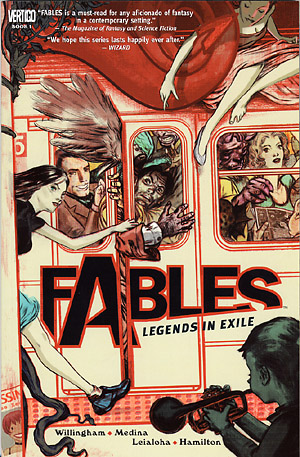 To put it briefly: Bill Willingham is a genius.
To put it briefly: Bill Willingham is a genius.To elaborate: he's created a world of fable characters (yes, all of them) that live in an enclave in New York City after fleeing their respective homelands (they don't all live in Happily Ever After, after all) as they were taken over by an unknown conqueror. The non-human fables (i.e. the Three Little Pigs) can't live unnoticed in the city (I'd question that concept, as there are some pretty strange characters around here that do look like they walked out of a fable) live on a farm upstate.
Each new character in the books is a chance to place that name to the story it has come from. Some are obvious (Snow White and Prince Charming, for example), some slightly trickier (Bigby Wolf) and some I still haven't placed (Baba Yaga, anyone?). Willingham cleverly twists the very nature of fables to his own use; the invincibility of a fable, for example, is directly related to the popularity of his or her story. The more popular the story, the harder it is to kill its characters. He also answers some questions that I'm sure have bothered many a questioning child. How could Prince Charming be in so many stories? What does "happily ever after" really mean? Prince Charming has three ex-wives and Beauty and the Beast are still married but sick of each other—does that help answer your question?
Willingham takes his characters throughout centuries of world history: Bigby Wolf was a Special Ops leader in World War II, Jack Horner fought on both sides of the Civil War, Hansel led the crusade against witches in Salem. Clearly, these fables have been living here with us for quite some time, and, when necessary, or when they feel like it, they have intervened in the lives of us mundane humans. But they also have their own battles to fight...
I'll leave it at that lest I spoil any more. Thanks to Jay for lending me the books all summer. You can preview the first part of the first book here.







